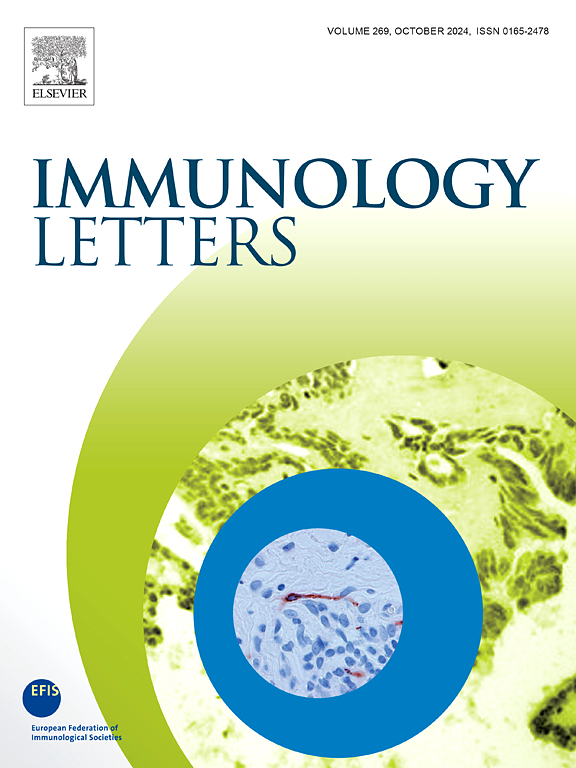艾加替莫德治疗神经自身免疫性疾病的疗效和安全性。
IF 2.8
4区 医学
Q3 IMMUNOLOGY
引用次数: 0
摘要
目的:重症肌无力(MG)是一种以神经肌肉突触传递中断为特征的自身免疫性疾病。Efgartigimod是一种人类Fc受体拮抗剂,已被批准用于MG患者。它在其他igg介导的神经自身免疫性疾病中的潜在用途尚不清楚。本研究旨在回顾性评价艾加替莫在神经自身免疫性疾病患者中的疗效和安全性。方法:回顾性研究在河南省人民医院接受依加替莫德治疗的神经系统自身免疫性疾病患者。采用生活质量改善评分和艾加替吉莫治疗前后IgG水平分析用药效果。通过考虑不良事件和血液参数来评估药物的安全性。血液参数,包括血常规参数、凝血、肝、肾和免疫功能。结果:2023年9月1日至2024年1月31日,17例患者在河南省人民医院接受依加替莫德治疗。MG患者在艾格替莫德治疗4周后,重症肌无力的日常生活活动(MG- adl)较基线降低(P0.05)。IgG水平在第一次注射后显著降低,多次注射后逐渐降低(P0.05)。治疗期间两组血液指标无明显变化(P < 0.05)。结论:Efgartigimod对神经系统IgG介导的自身免疫性疾病有效且安全,即使在血清IgG水平未升高的患者中也是如此。本文章由计算机程序翻译,如有差异,请以英文原文为准。

Efficacy and safety of efgartigimod in patients with neurological autoimmune diseases
Objective
Myasthenia gravis (MG) is an autoimmune disease characterized by disrupted neuromuscular synaptic transmission. Efgartigimod, a human Fc receptor antagonist, has been approved for patients with MG. Its potential use for other IgG-mediated neurological autoimmune diseases is unclear. This study aimed to retrospectively evaluate the efficacy and safety of efgartigimod in patients with neurological autoimmune diseases.
Methods
This retrospective study investigated patients with neurological autoimmune diseases who were treated with efgartigimod in the Henan Provincial People's Hospital. The efficacy of the medication was analyzed using the quality-of-life improvement score and the IgG level pre- and post-efgartigimod treatment. The safety of the medication was assessed by considering adverse events and blood parameters. The blood parameters, including routine blood parameters, coagulation, liver, kidney, and immune function.
Results
Seventeen patients received efgartigimod in the Henan Provincial People's Hospital from September 1, 2023, to January 31, 2024. In MG patients, myasthenia gravis activities of daily living (MG-ADL) reduced after efgartigimod treatment for 4 weeks compared with baseline (P < 0.05). Autoimmune encephalitis (AE) is a group of inflammatory disease with antibodies against neuronal synaptic and cell surface antigens. Similarly, patients with AE had a statistically significant reduction in modified Rankin scale (mRS) after efgartigimod treatment for 4 weeks compared with baseline (P < 0.05). Guillain Barre syndrome (GBS) is an immune-mediated disease of the peripheral nerves and nerve roots. However, the inflammatory neuropathy cause and treatment (INCAT) scale score didn't statistically differ in GBS patients before and after efgartigimod treatment (P > 0.05). The IgG levels significantly reduced after the first infusion and gradually decreased after multiple infusions (P < 0.05). Most subjects did not have increased IgG serum levels before treatment. IgA, IgM, and complement levels didn't differ significantly with efgartigimod treatment (P > 0.05). There were no changes in blood parameters during the treatment (P > 0.05).
Conclusions
Efgartigimod was effective and safe in neurological IgG-mediated autoimmune diseases, even in patients without increased IgG serum levels.
求助全文
通过发布文献求助,成功后即可免费获取论文全文。
去求助
来源期刊

Immunology letters
医学-免疫学
CiteScore
7.60
自引率
0.00%
发文量
86
审稿时长
44 days
期刊介绍:
Immunology Letters provides a vehicle for the speedy publication of experimental papers, (mini)Reviews and Letters to the Editor addressing all aspects of molecular and cellular immunology. The essential criteria for publication will be clarity, experimental soundness and novelty. Results contradictory to current accepted thinking or ideas divergent from actual dogmas will be considered for publication provided that they are based on solid experimental findings.
Preference will be given to papers of immediate importance to other investigators, either by their experimental data, new ideas or new methodology. Scientific correspondence to the Editor-in-Chief related to the published papers may also be accepted provided that they are short and scientifically relevant to the papers mentioned, in order to provide a continuing forum for discussion.
 求助内容:
求助内容: 应助结果提醒方式:
应助结果提醒方式:


